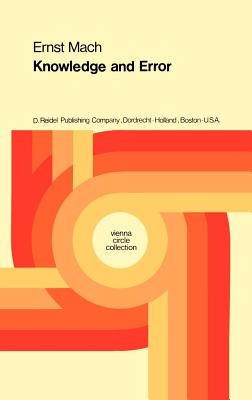
- We will send in 10–14 business days.
- Author: Ernst Mach
- Publisher: Springer
- Year: 1975
- Pages: 394
- ISBN-10: 9027702810
- ISBN-13: 9789027702814
- Format: 15.6 x 23.4 x 2.4 cm, kieti viršeliai
- Language: English
- SAVE -10% with code: EXTRA
Reviews
Description
Erkenntnis und Irrtum. Skizzen zur Psychologie der Forschung. Von E. MACH Emer. Professor an der Unlversltlt Wlen. LEIPZIG Verlag von Johann Ambrosius Barth 1905. INTRODUCTION XIII On a number of occasions Mach expressed the sentiment, especially in his correspondence, that America was the land of intellectual freedom and opportunity, the coming frontier for a new radical empiricism that would help to wash metaphysics out of philosophy. In 1901 he sponsored the German edition of Concepts and Theories of Modern Physics (1881) 2 by J. B. Stallo, Cincinnati lawyer and philosopher. Mach warmly endorsed Stallo's book because his scientific aims so closely approximated his own, and because Stallo rejected the latent metaphysical elements and concealed ontological assumptions of the mechanical-atomistic inter- pretation of the world. The second edition of Wiirmelehre was dedicated to Stallo in 1900. The fourth edition of Populiir-wissenschaftliche Vorlesungen (1910), containing seven new essays, was dedicated to Harvard Professor of physiology, philosophY, and psychology, William James. Mach had a strong intellectual affinity for James' pragmatism because, like himself, he recognized that James had come to radically empirical views from science. Both men took pure pre-conceptualized experience, from which the mental and physical predicates of experience are composed, to be neutral rather than real, unreal, objective or subjective.
EXTRA 10 % discount with code: EXTRA
The promotion ends in 22d.20:42:56
The discount code is valid when purchasing from 10 €. Discounts do not stack.
- Author: Ernst Mach
- Publisher: Springer
- Year: 1975
- Pages: 394
- ISBN-10: 9027702810
- ISBN-13: 9789027702814
- Format: 15.6 x 23.4 x 2.4 cm, kieti viršeliai
- Language: English English
Erkenntnis und Irrtum. Skizzen zur Psychologie der Forschung. Von E. MACH Emer. Professor an der Unlversltlt Wlen. LEIPZIG Verlag von Johann Ambrosius Barth 1905. INTRODUCTION XIII On a number of occasions Mach expressed the sentiment, especially in his correspondence, that America was the land of intellectual freedom and opportunity, the coming frontier for a new radical empiricism that would help to wash metaphysics out of philosophy. In 1901 he sponsored the German edition of Concepts and Theories of Modern Physics (1881) 2 by J. B. Stallo, Cincinnati lawyer and philosopher. Mach warmly endorsed Stallo's book because his scientific aims so closely approximated his own, and because Stallo rejected the latent metaphysical elements and concealed ontological assumptions of the mechanical-atomistic inter- pretation of the world. The second edition of Wiirmelehre was dedicated to Stallo in 1900. The fourth edition of Populiir-wissenschaftliche Vorlesungen (1910), containing seven new essays, was dedicated to Harvard Professor of physiology, philosophY, and psychology, William James. Mach had a strong intellectual affinity for James' pragmatism because, like himself, he recognized that James had come to radically empirical views from science. Both men took pure pre-conceptualized experience, from which the mental and physical predicates of experience are composed, to be neutral rather than real, unreal, objective or subjective.


Reviews